 |
 |
||||||
 |
|||||||
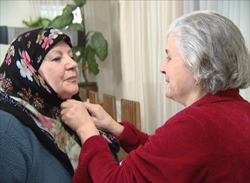
‘Metamorphosis Chat’ cites the narrative frame of Turkish soap operas. The artist’s mother, who has never worn a headscarf, meets a neighbour a teacher in modern dress, for tea. The two woman decide to switch roles and begin to exchange their clothes to become one another. Artist influence as director recedes as the women, letting themselves be carried away by the merriment of dress up, become their own authors. Their hearty friendliness, their opennes in dealing with what might otherwise be embarrising, their giggling at each other and themselves –all poke fun at the fear and agrresive moralizing other found in debates on symbols with religious connotations. (Extracted from Berlin Biennial catalogue text, 2010)
'Ferhat Özgür was born in Ankara in 1965 and still lives and works in Istanbul. He took part in 1st Tirana Biennale, 10th Istanbul Biennale and 6th Berlin Biennale. His works have been shown numerous international venues including Magazine4 Bregenz-Austria, Casino Luxembourg / Stiftelsen 3, 14 Bergen / Ludwig Forum Aachen- / Trienale Bovisa-Milan / Fotografie Forum Frankfurt.
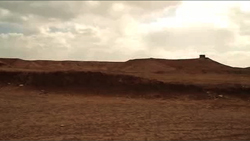
Confusing, actually...but some things you have to have experienced by yourself....and it doesn't matter if the gods -or those who claim to be- appear only in the context of your own work or as an imagined fata morgana of the your own artistic transfiguration. Both is confabulated garbage. Also the time of the Young Wild Ones is over. They also turned into old men...and only thing about the hanging of their painting instead of thinking about their content...
Christoph Schlingensief (1960-2010) Two months before his 50th birthday, director Christoph Schlingensief lost his battle against lung cancer. He passed away on August 21, 2010 in Berlin.
The polarizing film maker, performance artist and theater director liked to work across genres and was never afraid to provoke his audiences or expose the innermost aspects of his personality. In his play "A Church of Fear of the Stranger in Me" he dealt with his illness.
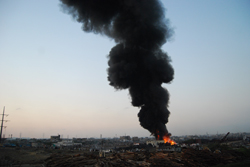
Karen Mirza and Brad Butler have been actively involved in the London art scene for over thirteen years and have participated in many exhibitions in leading institutions in Europe and abroad. They recently received the 2009 production grant from the Museum of Contemporary Cinema Foundation Madrid, they were Festival Award winners at The 2010 Chicago Film and Video Festival and were nominated for the 2010 Transmediale Award Berlin. Their current body of work, The Museum of Non Participation, commissioned by Artangel, proposes a museum as a conceptual (geo)political construct of gesture, image and thresholds of language. Their first film made in this context The Exception and the Rule has screened in over 16 major international festivals. www.mirza-butler.net
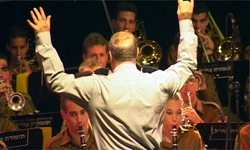
2 scenes shot in a car driving in the occupied territories. Israeli Human Rights journalists on their way to a story. In one scene they ask themselves if they should continue driving down the road because the locals say there is an Israeli tank shooting at whoever comes near it. In the second scene they detect the Istraeli military post where they were shot at from a few months earlier. In the third scene the IDF orchestra plays a happy march. Produced, directed, shot & edited by Avi Mograbi.
Avi Mograbi, filmmaker and video artist. He is the director of: Details 11-13 (2009), Z32 (2008), Mrs. Goldstein (2006), Avenge but one of my two eyes (2005), Detail (2004), August (2002), Wait, it’s the soldiers, I'll hang up now (2002), At the back (2000), Will you please stop bothering me and my family (2000) Relief, (1999), Happy Birthday Mr. Mograbi (1999), How I learned to overcome my fear and love Arik Sharon (1997), The reconstruction (1994), Deportation (1989).
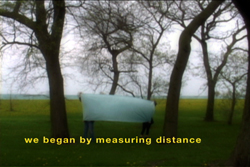
Long still frames, text, language, and sound are weaved together to unfold the narrative of an anonymous group who fill their time by measuring distance. Innocent measurements transition into political ones, examining how image and sound communicate history, tragedy, and the complication of Palestinian nationalism. We Began By Measuring Distance explores the ultimate disenchantment with facts when the visual fails to communicate the tragic.
Basma Alsharif is a Palestinian adj (Placename) of or relating to Palestine / n (Historical Terms) a native or inhabitant of the former British mandate, or their descendants, esp such Arabs now living in the Palestinian Administered Territories, Jordan, Lebanon, or Israel, or as refugees from Israeli-occupied territory Basma’s work is con·trived (kn-trvd) adj. Obviously planned or calculated; not spontaneous or natural; labored: a novel with a contrived ending artifice n 1. a clever expedient; ingenious stratagem 2. crafty or subtle deception 3. skill; cleverness 4. a skillfully contrived device 5. Obsolete craftsmanship.